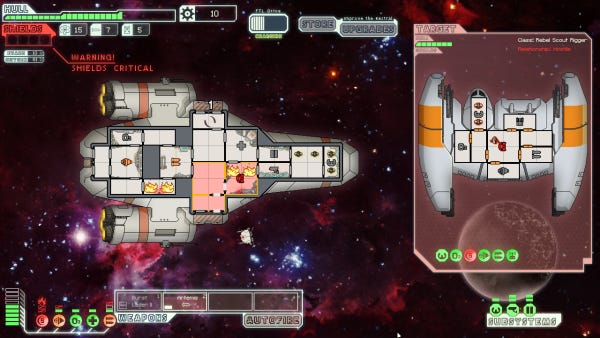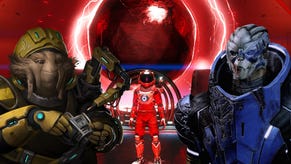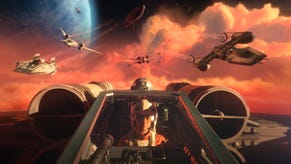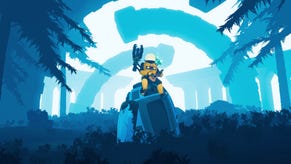Impressions: FTL Beta
Asphyxiation Fixation
FTL didn't just have a successful Kickstarter, it was stratospheric. Having asked for enough to finish off their roguelike spaceship sim, the two person development team received enough mony to build an actual interstellar vessel. Thankfully, they stuck around on Earth long enough to finish off the game, which should be out next month. In the meantime, here are my thoughts on the beta.
Space is terrifying because it is absolutely impossible to breathe in it and not breathing is horrid, leading to wheezing panic and death. Remember that bit in Total Recall when Arnie's face turned into plasticene and his eyes inflated like balloons? Hideous. As well as being opposed to human existence, space is also quite dark despite having stars, which are like massive light bulbs, scattered about its length and breadth. The lights are one of the few things that seem fairly stable on FTL's tiny ships, but the same can't be said of the oxygen systems, doors and engines. The limitless vacuum, and missiles, are always knocking at the hull and looking for a way in.
You may have already read about the frantic panic of ship-to-ship combat in FTL, with crew members being directed from one room to another attempting to keep machinery functional, manning the guns and shields, repairing broken computers and putting out fires. There are boarders to repel as well, although they can be dealt with by opening doors and letting all the oxygen out of whichever room they're in.
In an ideal world they'd do the Arnie balloon-eyed vein-burst and that'd be the end of it but what if a missile trashes the door controls while the whole ship is exposed to the lack of elements? It's entirely feasible that entire rooms will be cut off until those functions are restored and fixing them will take time, another crew member diverted, another face turning a terrible shade of blue.
At its best, FTL is the kind of game that will cause people to bang their fists on tables excitedly as they rave about last minute victories or comedic deaths. If you've played the boardgame Space Alert, whose planning phase is chaos and optimism and whose resolution phase is despair and comedic revelation, you might imagine that FTL is similar. However, with one player controlling the entire crew in FTL and having full knowledge of their destinations and actions at all times, the tiny people are perfect cogs in a machine rather than hapless, blithering idiots controlled by the fevered minds of anxious men.
That's not the only fundamental shift and despite the concordance in design (with Red November too, which I haven't played), the differences in the experiences are more interesting than the similarities.
In Space Alert, the ship that your hapless crew are responsible for is a heap of junk, a cobbled together mess of a vessel constructed for comedy rather than conquest. A screensaver activates on the main computer every minute or so and if nobody runs back to waggle the mouse, everyone is more than likely going to die in the next thirty seconds.
In FTL, ships are sleek and their design makes sense. Whoever is in charge of building these bad boys is a minimalist master because there's absolutely nothing without function. Everything is in its right place. It's the difference between the technology of Alien and the technology of Prometheus, the Millennium Falcon compared to whatever boring plastic piece of crap you care to pick from the prequel trilogy.
Because of that, or at least partly because of that, the frantic panic that has been part of almost every write up of FTL that I've read so far just doesn't happen often enough. I've played through the beta a few times and now, more often than not, I'm in complete control. Encounters in each sector are random, with a Weird Worlds styled node-based map, but there isn't enough variety in those events to keep things interesting for playthrough after playthrough.
Keep in mind that this is a game that can be paused while orders are issued, so the panic I'm talking about is of the cerebral and emotional kind rather than an actual inability to press buttons at the required rate. FTL is realtime but with the pause button it's actually turn-based, with turns taking as long as you want them to.
Most jumps to a new sector see your ship, usually repaired and ready for action, parking up alongside an enemy ship of similar size and construction. Sometimes there will be rocks bashing against your hull occasionally or other environmental hazards but they don't really change the plan, they just make the time to implement it even shorter. Divert power from engines and shift weapons and shields to full charge, and then target shields and weapons. If the swines try to flee then target their engines instead. It's a system, a routine, and it works the vast majority of the time.
Occasionally a critical hit will interrupt plans but it's rarely more than an interruption. Full scale disasters are rare because once you know the layout of your ship, ordering the less-than-a-handful of crew around isn't much of a challenge at all. There's the odd occasion when you'll be pushed forward with a hull creaking and leaking, with one bad encounter after another leaving your ship vulnerable and your crew on their last legs, but that seems more a case of bad luck than flustered mismanagement.
The pursuit of the fleet that is trying to catch your ship takes the form of a glowing red sphere, seeming to consume the stars as it travels forward. If it catches you, its space curtains for you and your brave crew. Its an absorbing ball of death at your heels and it's all the incentive you need to find the fastest path forwards...except what about all the stuff lying about in space, just waiting to be collected. The loot is where FTL is at its most interesting and closest to its roguelike roots.
There are trading posts scattered through space and defeating ships will sometimes grant extra equipment - teleporters that allow boarding actions, guns that knock out systems rather than causing direct damage, drones that can repair, protect or assault. Balancing the placement of equipment, as well as the power that various systems require, lends some urgency as its effectively necessary to relearn routines whenever the loadout changes.
A powerful missile launcher might seem like a great idea but if it takes so much power that propulsion systems must be powered down entirely, maybe it's only good for one volley at the start of combat before energy is diverted back to cannons to leave enough for a bit of juice in the engines. For evasive maneuvers or, should the need arise, to power up the FTL drives and skedaddle.
Unlocking different ship types, with their own layouts and starting equipment, does make things more interesting but given that a playthrough can be completed in an hour or two, FTL lacks the sense of progression from weakling to still-vulnerable badass. There's not enough time to invest in your ship and its crew and so the outcome is less personal, whether they win or die.
EDIT: A save to quit function was added between me playing the game and actually writing about it. So read the next paragraph while snorting derisively at how long it took me to notice that.
It's the brevity of the game, along with a desire to stop people avoiding the consequences of actions or fate, that has led the developers to remove any save function. You're either playing through in one sitting, leaving it running on your taskbar, or losing your progress. I understand the reasoning but, at the very least, a 'save and quit' button would be most welcome. It's about investment again; even if they only have a maximum lifespan of a couple of hours, knowing that they can be obliterated mid-mission if my computer crashes makes my crew seem utterly disposable. And that's after the blasted game allows me to give them names!
FTL, which is still in beta but feature complete, does everything it was intended to do and does it well. It offers a crew-based take on ship-to-ship combat, systems management and the threat of space catastrophe. The scale feels small though and that reduces the pressure. Operating a ship soon seems like quite a simple job and the soundtrack is more often the hum of a well-organised machine rather than the blaring klaxon of terror and excitement. It's a marvellously efficient creation but, for me, it too quickly loses the element of surprise, the unknown and the sense of voyaging, at desperate speed, to new frontiers.
Having said all that, I just noticed that Steam reckons I've played the beta for eighty hours. Some of that is definitely explained by me leaving missions running on pause so as not to lose my progress but I have played this game a lot. And I've enjoyed myself a lot, it's just that my experiences don't seem to tally with a lot of the descriptions I'm reading. It seems less about organising chaos and story organisation, and more about management and smart tactics. Despite having been a tad critical, I'm almost definitely about to try and beat it again.




















